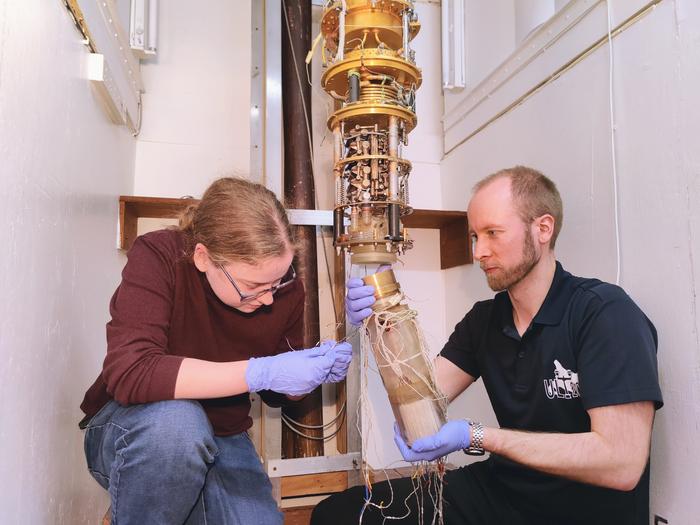One of the greatest mysteries of science could be one step closer to being solved.

Credit: Lancaster University
One of the greatest mysteries of science could be one step closer to being solved.
Approximately 80% of the matter in the universe is dark, meaning that it cannot be seen. In fact, dark matter is passing through us constantly – possibly at a rate of trillions of particles per second.
We know it exists because we can see the effects of its gravity, but experiments to date have so far failed to detect it.
Taking advantage of the most advanced quantum technologies, scientists from Lancaster University, the University of Oxford, and Royal Holloway, University of London are building the most sensitive dark matter detectors to date.
Their public exhibit entitled “A Quantum View of the Invisible Universe” is showcased at this year’s Royal Society’s flagship Summer Science Exhibition from 2-7 July 2024.
The researchers include Dr Michael Thompson, Professor Edward Laird, Dr Dmitry Zmeev and Dr Samuli Autti from Lancaster, Professor Jocelyn Monroe from Oxford and Professor Andrew Casey from RHUL.
EPSRC Fellow Dr Autti said: “We are using quantum technologies at ultra-low temperatures to build the most sensitive detectors to date. The goal is to observe this mysterious matter directly in the laboratory and solve one of the greatest enigmas in science.”
There is indirect observational evidence of the typical dark matter density in the galaxy, but the mass of the constituent particles and their possible interactions with ordinary atoms are unknown.
Particle physics theory suggests two likely dark matter candidates: new particles with interactions so weak we haven’t observed them yet, and, very light wave-like particles termed axions. The team are building two experiments, one to search for each.
Of the two candidates, new particles with ultra-weak interactions could be detected through their collisions with ordinary matter. However, whether these collisions can be identified in an experiment depends on the mass of the dark matter being searched for. Most searches so far would be able to detect dark matter particles weighing between five and 1,000 times more than a hydrogen atom, but it is possible that much lighter dark matter candidates may have been missed.
The Quantum Enhanced Superfluid Technologies for Dark Matter and Cosmology (QUEST-DMC) team aims to reach world-leading sensitivity to collisions with dark matter candidates with mass between 0.01 to a few hydrogen atoms. To achieve this, the detector is made of superfluid helium-3, cooled into a macroscopic quantum state and instrumented with superconducting quantum amplifiers. Combining these two quantum technologies creates the sensitivity to measure extremely weak signatures of dark matter collisions.
By contrast, if dark matter is made from axions, they will be extremely light – more than a billion times lighter than a hydrogen atom – but correspondingly more abundant. Scientists would not be able to detect collisions with axions, but they can search instead for another signature – an electrical signal that results when axions decay in a magnetic field. This effect can only be measured using an exquisitely sensitive amplifier that works at the highest precision allowed by quantum mechanics. The Quantum Sensors for the Hidden Sector (QSHS) team is therefore developing a new class of quantum amplifier that is perfectly suited to search for an axion signal.
The stand at this year’s exhibition will enable visitors to observe the unseeable with imaginative hands-on exhibits for all ages.
Demonstrating how we infer dark matter from observing galaxies, there will be a gyroscope-in-a-box that moves in surprising ways due to the unseen angular momentum. There will also be glass marbles that are transparent in liquid, showing how invisible masses may be observed using clever experimentation.
A light-up dilution refrigerator will demonstrate how the team achieve ultra-low temperatures, and a model dark matter particle collision detector will show how our Universe would behave if dark matter behaved like normal matter.
Visitors can then search for dark matter with a model axion detector by scanning the frequency of a radio receiver, and they can also create their own parametric amplifier using a pendulum.
Cosmologist Carlos Frenk, Fellow of the Royal Society and Chair of the Public Engagement Committee, said: “Science is vital in helping us understand the world we live in – past, present and future. I urge visitors of all ages to come along with an open mind, curiosity and enthusiasm and celebrate incredible scientific achievements that are benefiting us all.”
The research in this exhibit is supported by the UKRI Quantum Technologies for Fundamental Physics programme.



